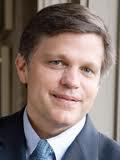In today’s anarchy of social media and “breaking news,” it’s hard to recall a time when America’s journalistic standards were so high that fact-checking took precedence over speed. That era ended on March 6, 1981, when Walter Cronkite bade his audience goodnight for the last time.
Cronkite built his reputation as “the most trusted man in America” by presenting the facts with a straightforward objectivity over nearly nineteen years as anchorman of The CBS Evening News. In his superb biography, Douglas Brinkley guides us in detail through Cronkite’s entire career, beginning with his days as a paperboy in Kansas City, Missouri. The son of a dentist, he grew up in Houston, where a high school teacher remembered him “running up and down the corridors with a little pad and pencil, looking for news items.” Cronkite earned his stripes in various radio, newspaper and wire service roles until his distinctive voice got him a broadcasting job at KCMO in Kansas City.
During World War II, he became a United Press correspondent in London, making friends with bomber crews and writing dispatches about their missions. He survived German flak to provide an eyewitness account of a bombing run over Wilhelmshaven in 1943. He also landed with glider troops to cover Operation Market Garden during the Battle of the Bulge. His unique cadence prompted Ed Murrow to offer him a job at CBS. Cronkite had what producer Don Hewitt called “telegenic” appeal, plus a knack for ad-libbing that boiled down detailed stories to the essentials. Notables, including future President John F. Kennedy, enrolled in a Cronkite class on how to look good on TV.
One o f the excellent features of this book is its running account of how television news evolved, from its roots in a poorly-paid band of newspaper and wire service reporters trained to track down facts like bloodhounds. The war produced a host of broadcasting legends including Ed Murrow, Lowell Thomas, John Cameron Swayze, Douglas Edwards, Andy Rooney, Eric Sevareid and Cronkite himself.
f the excellent features of this book is its running account of how television news evolved, from its roots in a poorly-paid band of newspaper and wire service reporters trained to track down facts like bloodhounds. The war produced a host of broadcasting legends including Ed Murrow, Lowell Thomas, John Cameron Swayze, Douglas Edwards, Andy Rooney, Eric Sevareid and Cronkite himself.
Readers may be surprised to learn that prior to taking the reins of The CBS Evening News, Cronkite briefly hosted a game show, “It’s News to Me”; a historical reenactment program called “You Are There”; and a morning news show, during which he bantered with a lion puppet named Charlemagne. One of his brightest accomplishments was hosting “The Twentieth Century,” a classy weekly documentary program.
Brinkley’s account is rich in anecdotes, such as Cronkite’s 1952 joust with UNIVAC, an election night computer, and his 1960 pre-convention interviews with Richard Nixon and John Kennedy. His excellent handling of milestones like Kennedy’s assassination, the Vietnam Tet Offensive, and the Watergate scandal bolstered his reputation for reliability and fairness.
Running through it all is Cronkite’s drive to establish The CBS Evening News as America’s standard for integrity; his insistence on double-checking stories before airing them; his competitive drive to beat NBC in the ratings battle; and his unabashed enthusiasm for NASA’s space program. To Cronkite’s mother Helen, it was ironic; “her son, who had failed physics at the University of Texas, was explaining [John] Glenn’s flight to millions of Americans.” He succeeded because he worked tirelessly to learn all he could about every event he covered.
Cronkite had his share of setbacks. His handling of the 1964 Republican convention almost wrecked his career. Colleagues denounced him for his soft-pedalled interview with Mayor Richard Daley following brutal police action during the 1968 Democratic convention. But he always seemed to come out on the right side. His 1968 documentary on the Vietnam War was a major factor in its eventual outcome. Brinkley’s book touches occasionally on the ever-present dilemma all news vendors face, trying to be objective and truthful without alienating advertisers, their life’s blood.
It’s hard to believe that the most trusted man in America was a heavy drinker who spent a lot of times in bars and telling dirty jokes. Despite his success he was tight-fisted and always willing to let someone else pick up his dinner tabs. And he was as susceptible to professional jealousy as anyone, as witnessed by his scratchy relationship with Dan Rather, his eventual replacement. Nothing, however, prevented viewers from fondly dubbing him “Uncle Walter,” a down-to-earth news pontiff they could relate to.
Be advised that Brinkley’s biography contains a significant amount of profanity and offensive language, my reason for demoting it from five stars to four.

